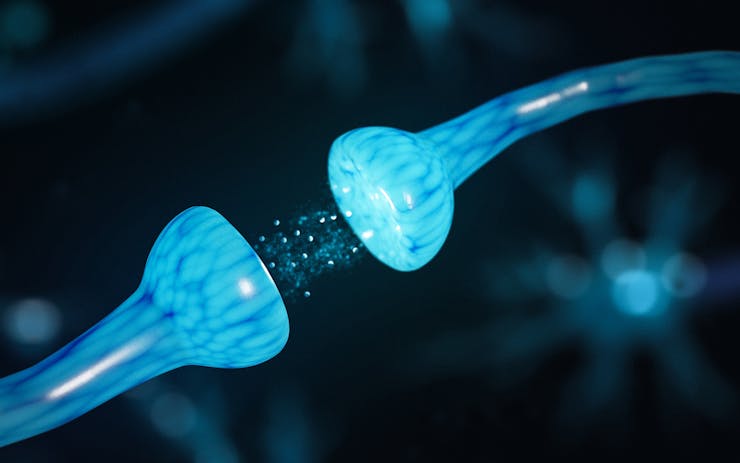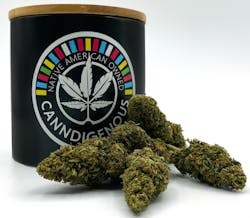It’s a lot easier to treat a disorder that has a known cause than one that doesn’t. Unfortunately, there is no one cause for autism, which makes it difficult to engineer targeted medications.
Instead, a variety of factors contribute to the development of autism: genetic mutations, environmental factors (e.g., pesticides, prenatal drug exposure, parental age) or a combination. The wide range of contributing factors underscores why autism is considered a spectrum with symptom severity ranging from mild to severe. This makes pharmacological treatment of autism particularly difficult. However, accumulating evidence suggests that in many cases of autism, there’s a reduction in the brain’s “inhibitory tone” (see below). This suggests that cannabis-based medications, particularly CBD-rich preparations that enhance the brain’s inhibitory signaling, may be a potential autism treatment.
What Characterizes Autism?
Autism Spectrum Disorder (ASD) is characterized by communication deficits, abnormal social behavior, and restricted and repetitive motor behaviors (for a more detailed description of ASD, see Leafly’s earlier article on the subject). There’s no genetic test that says you have ASD, and it’s not something that can be revealed by a routine blood screen or an MRI. Therefore, ASD can only be diagnosed through developmental screening and a comprehensive diagnostic evaluation.
In some cases, it’s obvious. Some children are incapable of making prolonged eye contact. They become highly emotional at the presentation of certain foods, overwhelmed by their smell. Certain noises make them cover their ears and rock back and forth. They may escape to a quiet corner, away from other children. These behaviors, and others common in children with ASD, reflect atypical responses to sensory stimuli.
Hypersensitivity to stimuli reflects an impaired “dampening” of sensory information in the brain. Indeed, reduced inhibitory signaling by the neurotransmitter, GABA, is a common neurological signature of ASD. If you think of the brain like a radio, inhibitory signaling by GABA doesn’t just reduce the volume of the music, it can also make the sound clear and comprehensible. So a faulty break, as in the case of many individuals with ASD, can lead to overwhelming sensory input that contributes to impaired language skills and abnormal social behavior.
Studies out of Karl Deisseroth’s lab at Stanford found that elevating GABA in genetic mouse models of autism can normalize social behavior. Deisseroth is a pioneer of the optogenetics technique in which light is used to modulate neuron activity. In one set of experiments, his team implanted light-emitting diodes in the brain of normally-behaving mice, that when activated, would silence GABA-releasing neurons. When they switched the light on, the mice spent less time in social interaction. Next, they implanted a light into GABA-deficient mice that displayed autism-like social deficits. In this case, when they turned the light on, GABA neurons would be activated. As predicted, increasing inhibitory GABA signaling in this mouse model of autism normalized their social behavior.
These studies emphasize the importance of GABAergic signaling in normal social behavior, at least in mice, and they propose that targeting the GABA system may improve symptoms of ASD. That’s where cannabidiol (CBD) comes in…but more on this shortly.
Understanding Autism and Epilepsy
Reduced inhibition in the brain doesn’t just cause the defining symptoms of ASD, but can contribute to a host of comorbid disorders. For instance, between a quarter and half of individuals with ASD also have epileptic seizures. The comorbidity between epilepsy and ASD reflects a tipping in the brain’s excitatory/inhibitory balance towards excitation. Seizures result when the balance between the brain’s excitatory function and the brain’s inhibitory function shifts too heavily towards excitation. Epilepsy reflects a chronic imbalance that results from a permanent shift towards excitation.
These results reveal CBD’s potential to reduce autism-like impairments in social interaction and social anxiety that are caused by impaired inhibitory signaling in the brain.
One of the biggest questions regarding the feasibility of treating ASD in epileptic patients is whether it’s too late. Seizures can wreak havoc on the brain and alter the way in which neurons communicate and connect with one another and can rewire the brain. Is it seizures early in one’s life that cause ASD or is ASD the result of aberrant brain activity, like a reduction in the strength of the brain’s inhibition? This is a critical question because if early-life seizures rewire the brain and cause ASD, then it may be too late for pharmacological intervention; cannabis, for all it may be good for, can’t reverse these effects. However, if ASD, in some cases, is merely the result of an imbalance in brain function, then there’s hope.
How Cannabidiol (CBD) May Help Autism
The successful Phase III clinical trial demonstrating CBD’s antiepileptic effects in children with treatment-resistant epilepsy was exciting news for the epilepsy and medicinal cannabis communities. However, it did not address whether CBD treatment was effective at combating any other aspects of the disorder, like ASD.
Over the last couple of years, my lab has been researching CBD’s ability to treat seizures and autism in our mouse model of ASD and epilepsy. In a recent study, we present the first pre-clinical evidence that CBD can effectively treat autism in these mice.
How do you measure autism behaviors in mice? There are several tests that scientists commonly use to model social behavior. One test measures the time spent socially interacting with another mouse. When compared to time interacting with an inanimate object, normal developing mice show a strong preference for interacting with the mouse compared to the object. Mouse models of autism are indifferent about spending time interacting with a mouse versus an object. However, when given CBD, our mice gained a preference for socially interacting with the mouse. This test demonstrated that CBD improves social interaction deficits consistent with those seen in children with ASD, but it didn’t inform us of CBD’s effects on the quality of the interaction.
To gain insight into the qualitative elements of social interaction, we placed two mice in a square testing chamber simultaneously and allowed them to freely explore the chamber and interact with each other. In this test, ASD mice would frequently dart away from their social interaction and huddle in the corner of the chamber. We interpreted this to be a measure of social anxiety, which was likely, in part, driven by overwhelming sensory stimuli. CBD was able to normalize this abnormal escape behavior. These results reveal CBD’s potential to reduce autism-like impairments in social interaction and social anxiety that are caused by impaired inhibitory GABAergic signaling in the brain, which is a common underlying feature of ASD.
These improvements in social behaviors were associated with CBD’s ability to enhance inhibitory brain function by increasing the activity of the neurons that regulate the level of inhibition in the brain. By restoring this excitatory/inhibitory balance in the brain, CBD can reduce seizures and normalize social behavior…at least in mice.
To date, there is only one clinical trial looking at CBD’s effectiveness in ASD which is being led by Dr. Adi Aran from the Shaare Zedek Medical Center in Jerusalem, but that trial isn’t expected to be completed until July 2019. However, there’s amassing parental anecdotal evidence that CBD eases many of their children’s ASD symptoms. Anecdotal reports aren’t sufficient to cause a shift in the medical community’s ASD treatment strategy, but they certainly justify further investigation. Combined with the recent pre-clinical data, there’s reason to be excited about the future of cannabis for ASD treatment.





